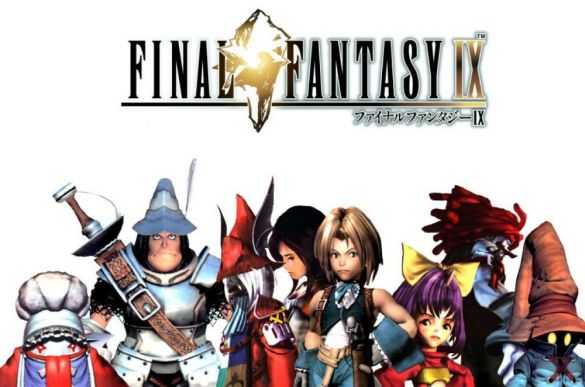 Released by Squaresoft (now more widely known as yours truly, Square Enix) in the year 2000, Final Fantasy IX is the ninth installment in the mainline Final Fantasy series, and is, as of right now, one of the most critically acclaimed games in the entire franchise. Praised for its creative graphics, nostalgic elements, easy-to-learn battle system, and unique characters, the game is nothing short of an engaging experience for all ages and backgrounds. Nevertheless… what is a Final Fantasy game without its moral lessons? From IV’s theme of “everyone and anyone can change for the better” to VII’s message on protecting the planet, this series has always been one thats been able to teach its players valuable life lessons, and let players choose their own interpretations of said lessons. So, I’m going to go over 9 things that the 9th game in the Final Fantasy franchise – as well as my personal favourite; don’t come at me – has taught me.
Released by Squaresoft (now more widely known as yours truly, Square Enix) in the year 2000, Final Fantasy IX is the ninth installment in the mainline Final Fantasy series, and is, as of right now, one of the most critically acclaimed games in the entire franchise. Praised for its creative graphics, nostalgic elements, easy-to-learn battle system, and unique characters, the game is nothing short of an engaging experience for all ages and backgrounds. Nevertheless… what is a Final Fantasy game without its moral lessons? From IV’s theme of “everyone and anyone can change for the better” to VII’s message on protecting the planet, this series has always been one thats been able to teach its players valuable life lessons, and let players choose their own interpretations of said lessons. So, I’m going to go over 9 things that the 9th game in the Final Fantasy franchise – as well as my personal favourite; don’t come at me – has taught me.
- You must always remain true to yourself. Many of us can relate to the struggle of trying to stay true to your own core values when you are stuck in a situation that won’t or cannot permit it – be it a strict work environment or an unsympathetic family. Garnet, the deuteragonist and lead heroine, struggles with this belief as she is forced to watch her home ravaged, come to terms with her real past, and deal with responsibility as a princess (and later on, the queen) of Alexandria – so much so that at one point she succumbs to the traumatic stress, which leaves her temporarily mute and with a difficulty concentrating during battles. However, despite all this, Garnet emerges from her battles – internal and external – as a confident and more experienced person… still keeping her core values and her strong will with her, and staying true to her beliefs until the very end.
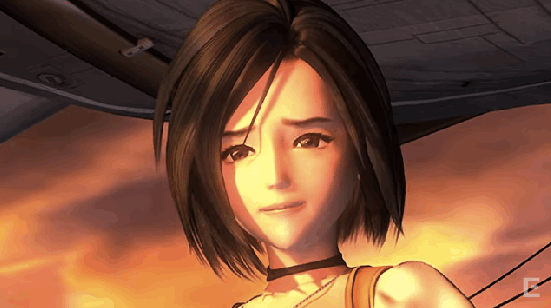
2. What you do for your friends, your friends will do to you. It’s a well-known saying that what goes around, comes around, and it certainly applies to friendship. Of course, almost every Final Fantasy game has the core message of friendship, but I feel that here it is a special case. Zidane, our rebellious and monkey-like protagonist, finds many of his new allies a bit weird and off-putting at first, but gradually opens up and forms bonds with them over the course of the story. This comes to a head when Zidane falls into a deep depressive state when his true nature as a Genome (a soulless being that only exists to cause war and chaos) is revealed, and he tries to cut himself off from his allies, believing himself to be unworthy of their friendship. Nonetheless, his friends are unwilling to give up on him, and remind him of all the things he’s done for them, how him being a Genome doesn’t matter to them, and how they want to do for him what he did for them. This powerful scene, coupled with the amazing You’re Not Alone theme, really drives home the point: friendship goes a long way!
3. You are not your past. All of us have events in our history that we’d rather forget and that we’d rather not tell to anyone. These events can take their hold on us and influence us in their own way. Vivi, the game’s resident Black Mage, is an adorable and well-meaning little fellow, but behind that exterior hides a dark past: all Black Mages were created from scratch by Kuja (our antagonist) to be disposable footsoldiers for Queen Brahne’s army, and Vivi is the prototype Black Mage, which is why he is capable of showing emotions. Vivi is shocked, and begins to wonder if his entire existence and raison d’être is just to be a mindless killing machine, but as he continues aiding his friends in their journey, he begins to accept himself for who he is now and puts the past behind him for the greater good. Vivi may be one of the most iconic Final Fantasy characters for his unique design, but the impact he’s left on players isn’t just skin-deep! Good job, Vivi!
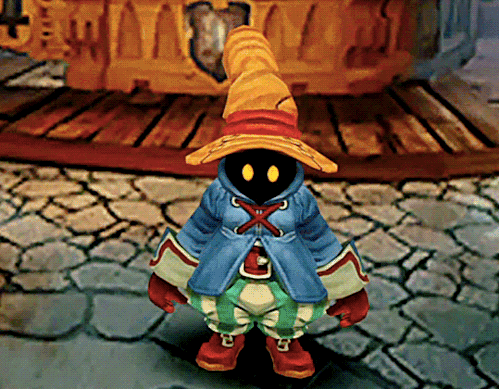
4. Be accepting of others, no matter what. Accepting other people for who they really are is something that is easier said than done. Zidane has difficulties trying to understand his motley crew of allies at first – after all, is it easy to accept a toddler wizard with philosophical tendencies, a stubborn knight who’s armor clanks every time he moves, and a giant Qu who thinks only of seeking “yummy-yummies”, amongst others? In fact, our protagonist only seems to accept them into his team out of obligation, or because he had no other choice in the matter. Nevertheless, as the game goes on, he begins welcoming his newfound friends for who they are – even if they do happen to be a little weird! This acceptance from him greatly improves their bond, and it is precisely this acceptance that the group thanks him for when he falls into his depressive state late in the game – which proves that getting to know others is insanely valuable. As Zidane himself says: “You don’t need a reason to help people”.
5. Nobody is useless. In this day and age, it’s easy for one to believe that their own efforts are fruitless and that they will amount to nothing. As a matter of fact, our main antagonist, Kuja, admits to feeling like his entire life was misguided and that he feels ‘useless’ after Zidane decides to save him. Zidane, however, rebukes Kuja – despite all the destruction he has caused – and tells him that “no one’s useless”. Not only does this scene speak volumes about both of their characters, but it’s true: every character in the game, even the villains, minor characters, and NPCs show their skills and prove their worth in the story, no matter how small that role may look like in the beginning. It goes to say that there are no small roles… only (quite literally, in this case) small actors!
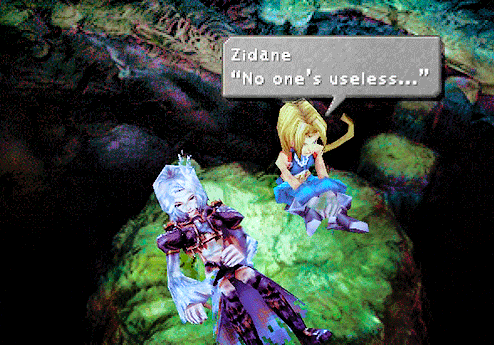
6. Sometimes, disobeying orders is the right thing to do. Now, I’m not trying to encourage petty crimes here, but sometimes not following your intended orders – whether they be made up or already set in stone – proves to be an advantage. No other character in the game represents this better than Steiner, the knight captain with a cranky disposition and a near-permanent frown. At the start of the game, Steiner is unwaveringly loyal towards Queen Brahne and will do anything to keep Princess Garnet safe, even if it means joining Zidane – who he resents, Zidane being a womanizing thief and all. However, after the Queen shows her true colours, Steiner is torn and confused on whether he should blindly follow whoever he’s told to follow. In the end, he decides to go against the Queen and place his trust in Garnet, and even forms a respectful relationship with Zidane, telling himself that he’ll think his alliances for himself from now on.
7. You cannot change the past or future, but you can the present. There are moments in our lives where we begin wishing that we could’ve changed something, anything, to get any kind of better result. Other times we find ourselves overthinking the future. A character who exemplifies this is Freya, a Burmecian anthropomorphic rat who regrets not being able to tell her love, Sir Fratley, how she truly felt in the past, and wanders the world in search of him. When the two are finally reunited, she’s heartbroken when he reveals that he lost his memory and doesn’t remember her at all, and she frets over what will happen to their relationship in the future. Be that as it may, Freya makes the decision to quit worrying about such meaningless, and by the end, she is shown with Sir Fratley, who finds himself falling in love with the same woman he left years ago, deciding (at least for now) to continue living in the present and live it to the fullest.
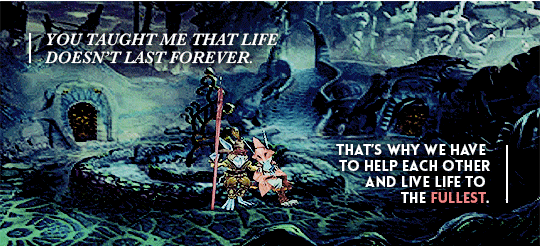
8. Influences help you grow. Our parents have always warned us about people who may be bad influences to us, but what about those who end up becoming our guardian lights? None of the main characters are capable of confiding or placing much faith in each other, as all of them view the others as a bit strange and odd. Despite this, they gradually are able to influence each other in nuanced ways – such as Garnet gaining her courage from Zidane and Zidane coming to terms with his mistakes through Garnet. These subtle yet effective influences certainly show the character development and growth of the main party in a big way, and it just goes on to say that even the people you may not initially trust can have a great effect on your life.
9. The journey is more important than the destination. I know, I know. This here phrase has more-or-less become common sense now, and it is a phrase that has been repeated in several Final Fantasy games. However, this phrase has never resonated with me in other FF games than it has with IX. In this game, although it was important, defeating Kuja and seeking the truth behind Queen Brahne’s chaotic reign was never the focus for me – what I really enjoyed the most was exploring the world of Gaia, listening to the one-of-kind soundtrack (courtesy of Nobuo Uematsu) while going about the various towns (Border Village Dali, anyone?) , and witnessing the lively and entertaining character dialogue and moments with the main cast. When it was all over, I found myself longing for my journey, not my quest, back. These small moments, for me, are forever unparalleled, and this adventure is definitely one I will never forget.
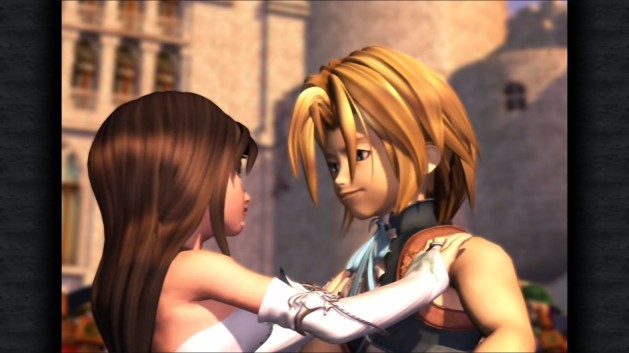
I seriously love love love this analysis! Final Fantasy IX is, and will always be my favourite video game. So reading this makes me happy, I totally agree with everything you said, and it makes me realize once again, how deep the story of FFIX is, and how well-written the characters are. This game is pure perfection, and I’m grateful whenever other fans show it to the world.
LikeLike